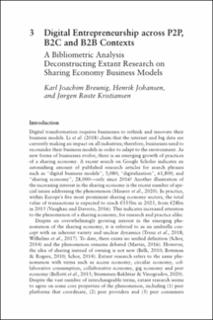Digital entrepreneurship across P2P, B2C and B2B contexts: A bibliometric analysis deconstructing extant research on sharing economy business models
Chapter, Peer reviewed
Published version
Permanent lenke
https://hdl.handle.net/11250/2997682Utgivelsesdato
2021Metadata
Vis full innførselSamlinger
- Publikasjoner fra Cristin [3269]
- SAM - Handelshøyskolen [392]
Sammendrag
Digitalization has become known as one of the most extensive drivers of development in society and has put pressure on companies to innovate their business models, with an emphasis on the opportunities provided by applying new digital technologies. Accordingly, there has been a major growth in business models focusing on resource exchange, referred to as the sharing economy. Currently, there is also a growing interest among researchers into the phenomenon of the sharing economy, and published research regarding this topic has grown exponentially. However, to date, the literature addressing the sharing economy appears complex and unstructured. The purpose of this study was to take stock of the extant literature, with a particular focus on distinguishing between constituent elements of the following sharing economy business models: peer-to-peer (P2P), business-to-consumer (B2C) and business-to-business (B2B). This study was conducted using a bibliometric method to map prior research in the sharing economy field. Utilizing a broad structured search of the Web of Science database, we identified the most relevant articles and synthesized the findings to suggest a framework distinguishing between the core properties of the P2P, B2C and B2B sharing economy business models. In addition to presenting a better overview of the existing literature, the framework provides a foundation upon which further research can be built. It can also serve practitioners with a better understanding of the phenomenon of the sharing economy, thereby affording a better basis for making strategic decisions related to their business model innovations.
